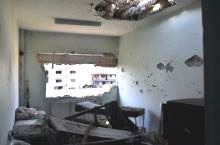 38 out of 124 public hospitals have been damaged as a result of the ongoing crisisSince the beginning of the unrest in the Syrian Arab Republic, the World Health Organization has been working with the Ministry of Health, the Syrian Arab Red Crescent and partners to address the acute and chronic health needs of Syrian populations affected by the crisis. This includes the provision of ambulances, the refurbishing and equipping of four mobile health clinics, and medicines and medical supplies for treating approximately 700 000 people.
38 out of 124 public hospitals have been damaged as a result of the ongoing crisisSince the beginning of the unrest in the Syrian Arab Republic, the World Health Organization has been working with the Ministry of Health, the Syrian Arab Red Crescent and partners to address the acute and chronic health needs of Syrian populations affected by the crisis. This includes the provision of ambulances, the refurbishing and equipping of four mobile health clinics, and medicines and medical supplies for treating approximately 700 000 people.
As the crisis continues into its 18th month, however, severe shortages in medicines and pharmaceutical products are being reported inside the country.
More than 90% of medicines in the Syrian Arab Republic were locally produced before the unrest began in February 2011. Since then, economic sanctions and an increase in operational costs have negatively affected the production of medicines and pharmaceutical products.
The recent escalation of clashes has impacted pharmaceutical plants in Rural Aleppo, Homs and Rural Damascus, where 90% of the country’s plants are located. Many of these plants have now closed as a result of the ongoing clashes and increased cost of fuel.
Syrian Ministry of Health statistics show that prior to the unrest, 52.7% of the population was receiving treatment for gastrointestinal diseases, respiratory diseases, cardiovascular diseases, renal diseases and cancer. Many of these patients are still dependent on locally produced medicines that are now no longer obtainable, and the reported shortages could have catastrophic results.
Urgently needed medicines identified by the World Health Organization and the Syrian Ministry of Health include those for tuberculosis, hepatitis, and other chronic health conditions such as hypertension, diabetes, thalassemia and cancer, as well as medicines for kidney disease. There is also an urgent need for chemical reagents for blood screening tests to ensure the safety and quality of blood used in surgical and trauma care in hospitals.
The World Health Organization has released a statement to the international community, donors and partners calling for contributions to covering health-related needs within the Syrian Arab Republic. Read the statement in Arabic | English.








